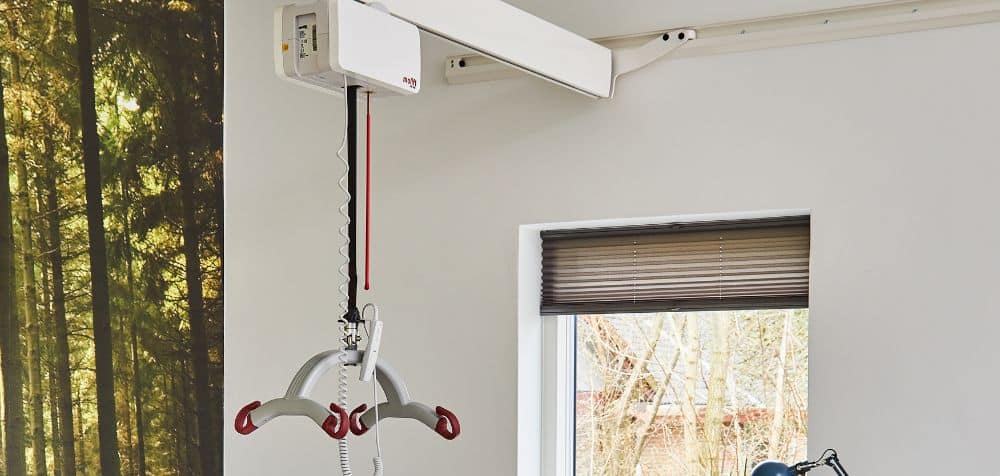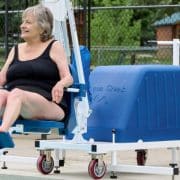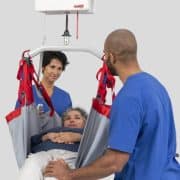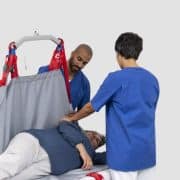Ceiling Hoists
Molift Ceiling Hoists are designed and built in Norway to comply with Australian ISO standards. They provide a range of hoists from the portable yet powerful Nomad to the new and class-leading AIR. Molift Ceiling Hoists are applicable for both home and institutional settings. We can provide you with a comprehensive design and installation service....

Molift Ceiling Hoists are designed and built in Norway to comply with Australian ISO standards. They provide a range of hoists from the portable yet powerful Nomad to the new and class-leading AIR. Molift Ceiling Hoists are applicable for both home and institutional settings. We can provide you with a comprehensive design and installation service.
Ceiling Hoists are used to transfer people between two locations (e.g. between a chair and a bed). A ceiling hoist comprises of a track which is fitted to the ceiling and an electrically powered lifting motor, which is also attached to a sling; which is subsequently attached to a patient sling. 
SYSTEM OVERVIEW
The Molift Rail System (MRS) is a ceiling hoist system built in three different main configurations:
1. Single rail system
2. Traverse rail system
3. Combination of single-rail and traverse systems
The area below the track system is defined as the lifting area. The area below a straight rail system is limited to the rail, while a traverse system gives lifting area below the area covered by the traversing secondary rail.
SINGLE RAIL SYSTEM
In a straight rail system the lift motor can be moved horizontally along the rail path. By combining MRS curves and rails it is possible to create single rail systems with expanded lifting area. The curve rail system can only be mounted to the ceiling and does not allow wall mounting.
Ceiling mounted straight rail system
Can be mounted in four different ways:
1. Directly to ceiling without brackets
2. Mounted to ceiling with brackets
3. Suspended from the ceiling with telescopic brackets
4. Suspended from the ceiling with threaded rods
The image shown below is ceiling mounted direct to ceiling without brackets
Figure Below: Ceiling Mounted with open ceiling using 40mm brackets
Figure Below: Ceiling Mounted with Telescopic Brackets
WALL MOUNTED STRAIGHT RAIL SYSTEM
A wall mounted system is mounted on separate wall brackets or on brackets connected to uprights supported by the wall.
Figure Below: Wall Mounted Wall Bracket Supported by Upright Supports
Figure Below: Wall Mounted Wall Bracket
TRAVERSE SYSTEM
A traverse system is built up by two parallel primary rails, a secondary rail connected to the primary rails by a traverse trolley in each primary rail. The lifting motor is connected in the secondary rail. This system allows full room coverage.
COMBINATION OF RAIL SYSTEMS
MRS allows a great variation of possibilities when combining traverse systems and single rail system. Transfer between different systems/rooms and locations can be solved in several ways with MRS The simplest way is by extending the single rail track through doorway.
Switch Systems
For Single rails, switching direction from straight rail to curve etc. Manually controlled.
Figure Below: Rail Switch
Traverse Switch
For transfer from secondary rail in a traverse system into a straight rail or another secondary rail in a traverse system. Manually controlled.
Figure Below: Traverse System with switch to straight rail
Figure Below: Traverse System with switch in both ends
Figure Below: Double Traverse System connect with switches
For more information review our Top 5 Reasons to Choose a Molift Ceiling Hoist
WHAT IS THE COST-BENEFIT OF USING A CEILING HOIST?
Most ceiling hoists can be purchased and fitted for around $5000 to $7000. With the average cost of a shoulder injury claim in the health and community services sector costing an average of $8600, the belief that installation of ceiling hoists (both retrofit and new build) is prohibitively expensive can be strongly argued. Studies have shown the payback period for the cost of ceiling hoists was 0.82 years to 2.5 years.
MOBILE HOISTS VS CEILING HOISTS?
A ceiling hoist cannot be everywhere in a building so, for this reason, they are not suited to every situation. When deciding on your lifting needs be mindful of the floor space required for mobile floor lifters. Each one takes up about 1 square metre of floor space and approximately one cubic metre of space in total. Also, floor lifters can be hard to push over some floor coverings and can cause shoulder back and knee injuries if used incorrectly.
Visit our blog page for more information about choosing a ceiling hoist
MAINTENANCE FOR A CEILING HOIST?
Ceiling hoist tracks should be cleaned as per the regular dusting schedule for rooms. Care should be taken that there is no foreign matter inside the rails to impede the travel of the ceiling hoist. All external parts of a ceiling hoist can be wiped down with antibacterial wipes. The sling should be laundered in accordance with the manufacturer’s washing instructions.
REFERENCES
Visit the NIOSH website for information on safe lifting and movement of nursing home residents.
Preferred Suppliers for the Healthcare Industry Since 2003
Patient Handling is founded on a sound base of great staff, great products and great partners. We strive to put our clients needs above all else and focus on well thought out solutions for complex needs.



Receive latest news
Contact Us
We are an online store only. Please contact us if you would like a product specialist to assist with your purchase.


















